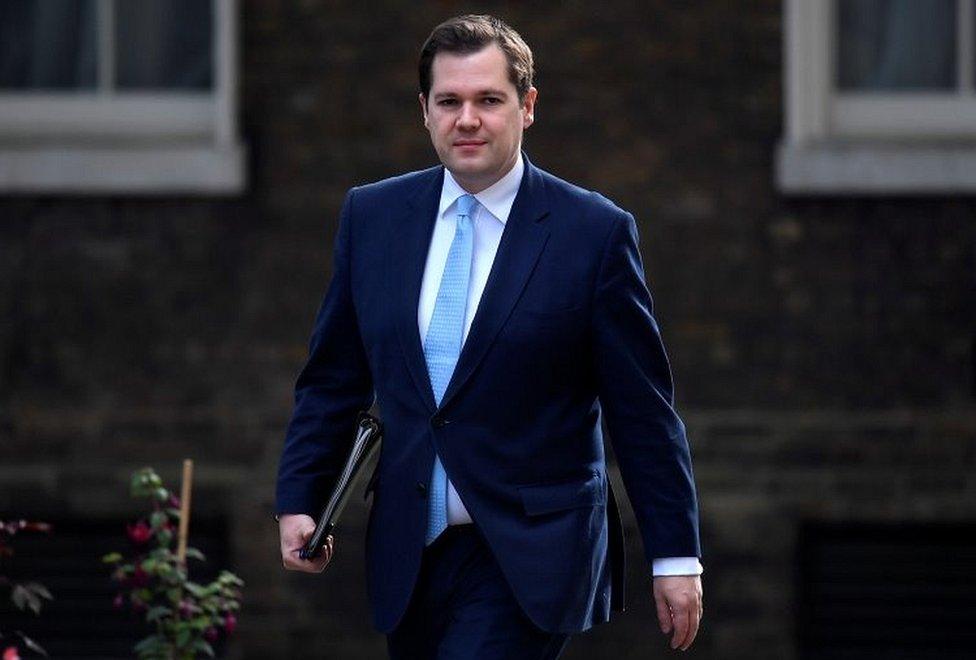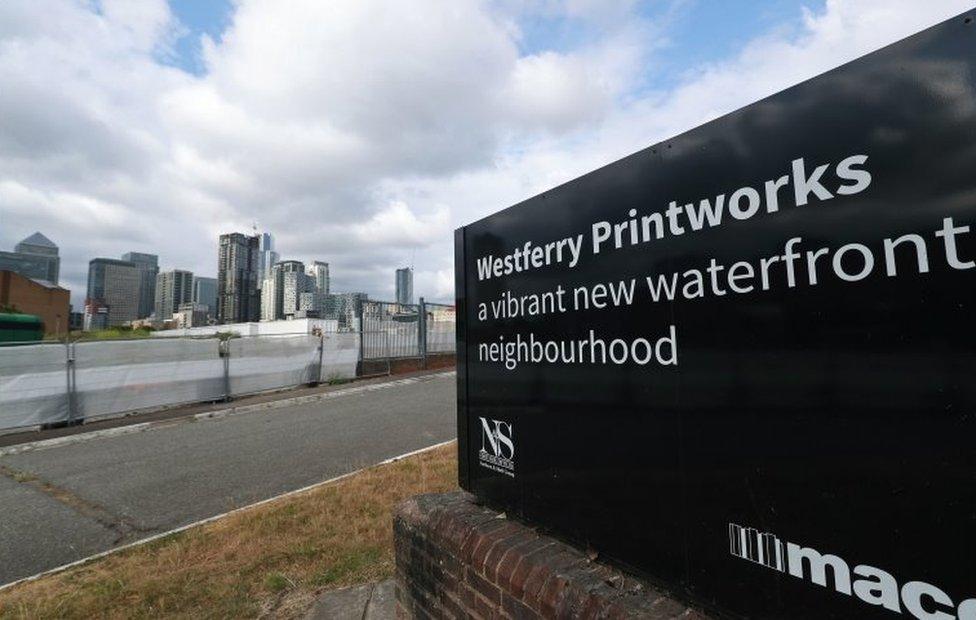Robert Jenrick: The key questions facing housing secretary
- Published

Housing Secretary Robert Jenrick is under fire over his decision to grant planning permission for a £1bn property scheme two weeks before the developer donated £12,000 to the Conservative Party.
He denies any link between the events, but his critics say he still has questions to answer.
Opposition MPs are calling for a vote on Wednesday to force the government to release all documents relating to the Westferry Printworks development in East London.
Here are some of the key questions he is likely to face in the Commons debate.
Did he fully disclose his contacts with the developer?
Robert Jenrick shared a table with property developer Richard Desmond at a fundraising dinner at the Savoy hotel for the Conservative Party last November, a couple of months before he gave the green light for Mr Desmond's £1bn scheme to build 1,500 homes in Docklands, east London.
The housing secretary told MPs his department "knew about the fact that I had inadvertently sat next to the applicant. I did not know who I was going to be seated by until I sat at the table. I discussed and took advice from my officials within the Department at all times."
The Sunday Times has since revealed, external Mr Desmond showed Mr Jenrick a promotional video of the development on his mobile phone. This could constitute lobbying, which raises a potential conflict of interest.
The Ministry of Housing, Communities and Local Government Department's own guidance means it has to publish details on ministerial meetings and hospitality. There is no record of the November dinner. A spokesperson told the BBC "nothing occurred which required publication in quarterly transparency data".
We do not know if Mr Jenrick offered or was advised to withdraw from the decision-making process because of this contact with Mr Desmond.
Why did he approve planning permission?
On 14 January, Mr Jenrick overruled a planning inspector and gave permission to build.
This was the day before a new Community Infrastructure Levy (CIL) came into force that would have meant the developer paying an extra £40m to support projects in Tower Hamlets, London's poorest borough.

Tower Hamlets Council said this gave the appearance of bias in favour of the developer and so it appealed, arguing that the secretary of state shouldn't be influenced by "a desire to assist the developer to avoid a financial liability".
Legal papers seen by the BBC state that Mr Jenrick was advised by his civil servants that "a decision should be issued before the council adopted its new Local Plan and CIL charging schedule".
There were concerns that a delay "could impact on the viability of the proposed development".
The project also included a lower proportion of affordable homes, which the council estimate may have benefitted the developer by up to £106m.
Why did he then quash his own decision?
In May, Mr Jenrick accepted the timing of this decision "would lead the fair-minded and informed observer to conclude that there was a real possibility" of bias - and that the decision should be quashed and a different minister should decide.
Tower Hamlets Council and others believe he did this to avoid having to release documents relating to the decision.
Labour Mayor John Biggs said: "We may never know what emails and memos the secretary of state received before making his decision and what influence they had, but his reluctance to disclose them speaks volumes."
Did he breach the ministerial code?
The ministerial code - a set of rules and principles issued by the prime minister which outlines standards of conduct - states that "if a minister meets an external organisation or individual and finds themselves discussing official business without an official present - for example at a social occasion - any significant content should be passed back to the department as soon as possible after the event".
Ministers must also "declare and resolve any interests and relationships" and "take decisions impartially, fairly and on merit, using the best evidence and without discrimination or bias".
Opposition MPs have written to the Cabinet Secretary Sir Mark Sedwill raising concerns about the deal and asking whether Mr Jenrick breached the code. The Cabinet Office said it would respond "in due course" but denied it was conducting an investigation.
The Electoral Commission has published figures showing Mr Desmond donated £12,000 to the Conservatives a fortnight after Mr Jenrick gave planning permission. Labour says this raised "cash-for-favours concerns".
A Conservative Party spokesperson said: "Government policy is in no way influenced by party donations - they are entirely separate." The party also says that the Desmond donation was for a table at a different event. We don't know who funded the table at the November dinner or who arranged for Mr Jenrick to be seated next to Mr Desmond and his colleagues.
No 10 said the PM had "full confidence" in Mr Jenrick. We do not know if Boris Johnson - who was at the November dinner - was aware of the promotional video.